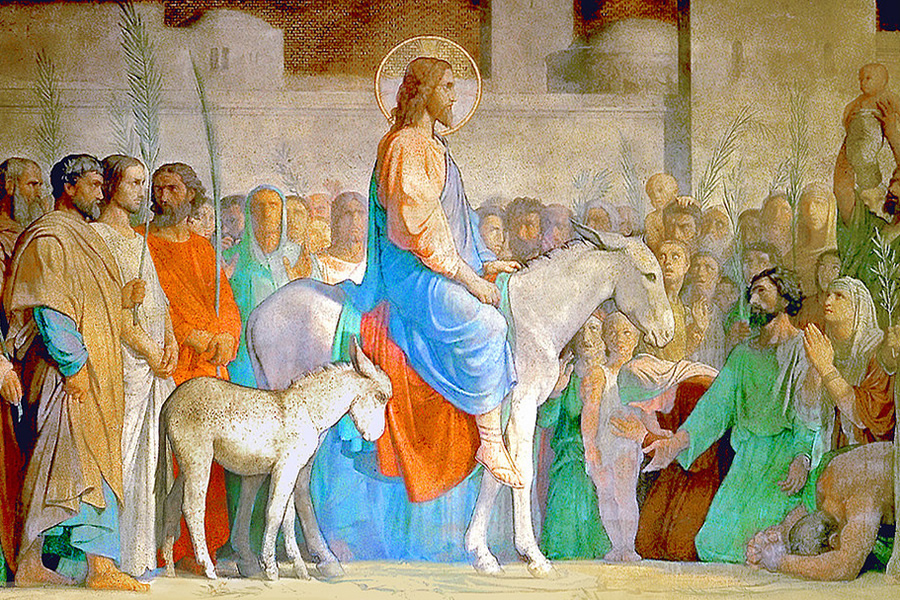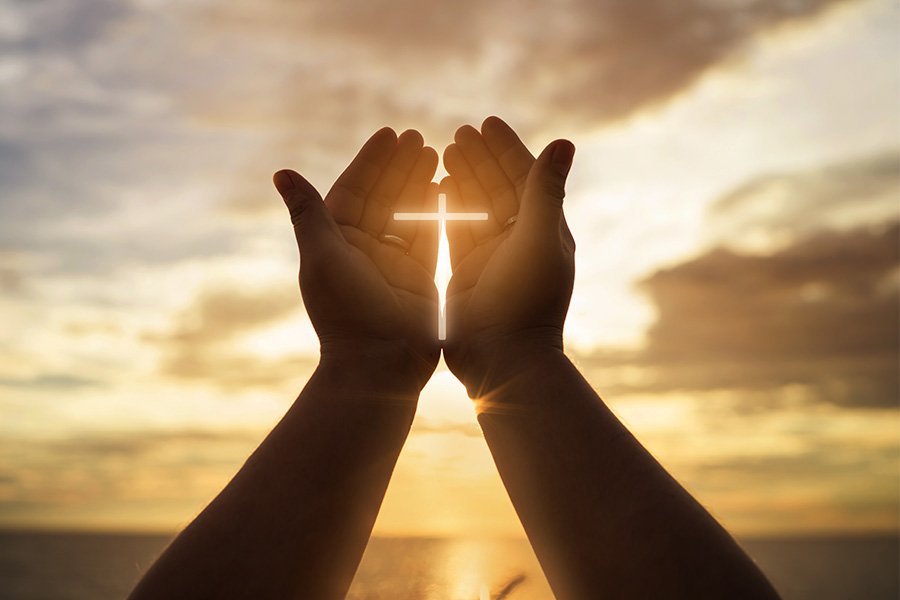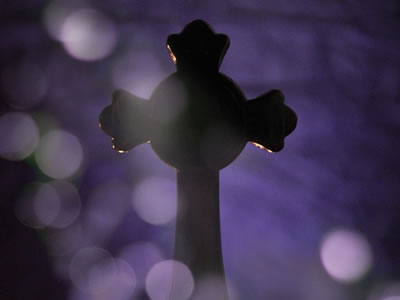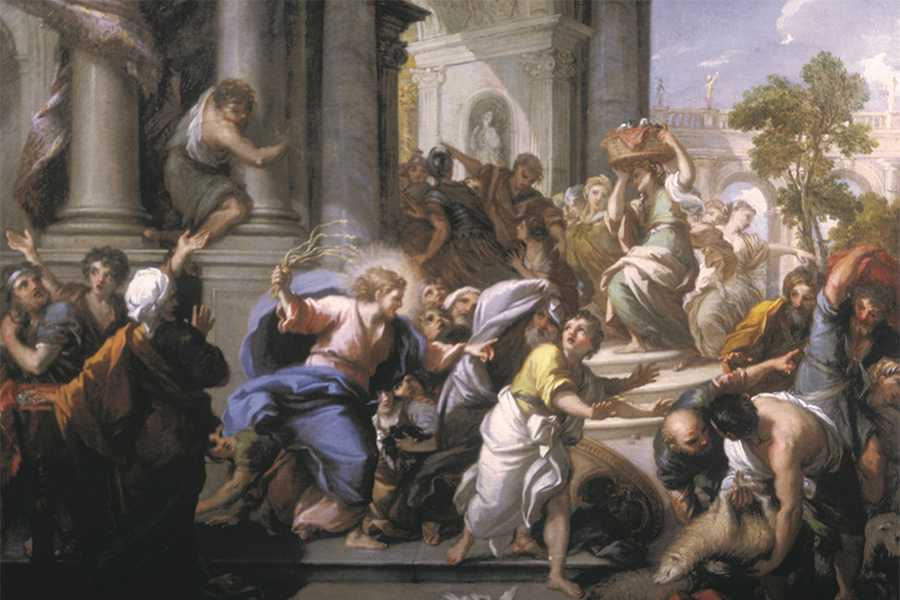Why do we wave palms on Palm Sunday?
by Fr. George Teodoro, S.J. | 03/23/2024 | Why do we do that?The procession of palms is an ancient tradition from many different cultures. People would line the streets waving palms to greet a ruler when they came to the city, or to hail a victorious general returning from battle. Palms and laurel branches were symbols of goodness and victory. Thus, when Jesus entered into Jerusalem before his Passion, the people of Jerusalem were continuing this ancient form of praise.
Continue
Palm Sunday of the Lord's Passion
by Kathryn Mulderink | 03/23/2024 | Gospel ReflectionWhat more can be said about today’s Gospel? We hear the proclamation of this Gospel in several voices, to help us enter into these final days of Jesus’ earthly life. The scheming of the chief priests and scribes before the Passover, the woman with the alabaster jar of oil prefiguring the anointing of his body for burial, Judas’ plan to betray him, the Last Supper and Jesus’ knowledge that he would soon be betrayed, the institution of the Eucharist so that he could remain with us until the end of time, Jesus’ prediction that the apostles would be scattered and their faith shattered. And then, all the events of Jesus’ profound Passion and Death.
Continue
A Lenten Stewardship Reflection: Compassion
03/17/2024 | Gospel ReflectionA central theme in the Gospel of Luke and a very good one for Lenten meditation is the notion of compassion. More than any other Gospel, Luke reveals the compassionate nature of Jesus Christ. Jesus said it emphatically and without mincing his words: “Be compassionate just as your Father is compassionate” (Luke 6:36, New Jerusalem Bible).
ContinueQ. Why do we have to go to confession with a priest? Why not just say “I’m sorry” to God in private prayer?
03/17/2024 | Why do we do that?As Catholics, we have an incarnational faith. We believe that Christ truly was made flesh and dwelt among us, and that each of us as humans are a union of body, mind, and spirit. Each of our sacraments has an incarnational component to it: the bread and wine of the Eucharist, the oils used for anointing, the water of baptism, etc. St. Augustine said that a sacrament is an “outward and visible sign of an inward and invisible grace.”
ContinueQ. What is purgatory? Why do Catholics believe in it, rather than just heaven and hell?
03/10/2024 | Why do we do that?From the foundations of Christianity, there was a belief that there were two options for the afterlife – the reward of Heaven for the just, and the pains of Hell for the unjust. And while these concepts are clear in the Gospels and easy to understand, there wasn’t much specific instruction for who goes where, other than the judgment scenes found in Matthew (24), Mark (13), and Luke (21) – “whatever you did for the least of my people, that you did to me.”
Within a couple of centuries, Christians wanted more specificity about sin and how to get into heaven. St. Jerome came up with the categories of venial sins and mortal sins to try to describe differences in the gravity and nature of our choices. He used the metaphor of debt – that to one creditor we may own just a few coins, while to another we may owe 10,000. By the Middle Ages, theologians became very exact in which sins required what amount of penance.
Continue
Fourth Sunday of Lent - Saying, Doing, or Being?
by Tom Schmidt | 03/10/2024 | Gospel ReflectionSt. Paul tells us in his letter to the Ephesians that we are saved through grace: God’s actions of sending his Son to die for us, and raising Jesus from the dead show the love God has for us. It comes entirely from God. We are saved by our faith in Jesus, but even that faith comes from God. So when Paul says that no one can boast about being saved, he means that we can’t add up our good deeds like reward points for heaven. He also means that we can’t brag about our faith because we can recite the creed or answer an altar call. So if being saved is not a matter of saying the right things, or doing good deeds, what is it?
Continue
He Understands Us Well
by Kathryn Mulderink | 03/03/2024 | Gospel ReflectionJesus came to save. From what? From sin, yes. From death, yes. But he goes to the very root cause of those things in every word and action of his life – and the root is hypocrisy and egoism, which is pride. In order to restore and defend man’s authentic relationship with God, Jesus must cleanse us from everything that gets in the way of that relationship, particularly whatever detracts from authentic faith and sincere worship. He came to save us from ourselves and our own contradictions.
ContinueQ. Why don’t we sing the Gloria or the Alleluia during Lent?
03/03/2024 | Why do we do that?Alleluia in Hebrew means “Praise God!” And obviously, the words of the Gloria come from the song of the angels at Christmas when they proclaim “Glory to God in the highest and on earth peace to people of good will!” Both songs, therefore, are expressions of joy – the celebration of God’s saving work and the proclamation that the Kingdom of God is at hand here in our Church, even as we await the Kingdom of Heaven which is our Christian reward. The Kingdom is already here, even though we have not yet seen it in its fullness.
ContinueWhat is fasting? What is abstinence? Why Fridays?
02/25/2024 | Why do we do that?Ash Wednesday and the Fridays of Lent are “obligatory days of fasting and abstinence for Catholics.” But what do these terms mean?
Continue
Second Sunday in Lent: This is a Test
02/25/2024 | Gospel ReflectionI used to wonder how God could lie to Abraham about sacrificing his son Isaac. But the story begins by telling us God put Abraham to the test. Abraham himself seems to know it’s a test—in verses left out or our reading, he tells the servants that he and Isaac will return after the sacrifice; he also tells Isaac that God will provide the offering. Apparently, I’m the only one fooled by God.
Continue
First Sunday of Lent: Clear Conscience
02/18/2024 | Gospel ReflectionUsually, the first reading has something in common with the gospel. Today’s however, has more in common with the second reading from St. Peter. They both talk about Noah and the ark, where the few good people were saved by going through the water. Peter compares that to the waters of Baptism, in which we are saved by God. He also has an interesting image of Jesus “preaching to the spirits in prison.” It refers to the fallen angels whose disobedience lead the rest of the population to turn away from God. Just as God washed away the evil of the world in the waters of the flood, so the waters of Baptism made us into a new people who have clear consciences, both because God has forgiven our sins and because we promise to follow only Him.
ContinueQ. Why don’t we sing the Gloria or the Alleluia during Lent?
02/18/2024 | Why do we do that?Alleluia in Hebrew means “Praise God!” And obviously, the words of the Gloria come from the song of the angels at Christmas when they proclaim “Glory to God in the highest and on earth peace to people of good will!” Both songs, therefore, are expressions of joy – the celebration of God’s saving work and the proclamation that the Kingdom of God is at hand here in our Church, even as we await the Kingdom of Heaven which is our Christian reward. The Kingdom is already here, even though we have not yet seen it in its fullness.
Continue
Nothing Frightens Jesus Away
by Sr. Kathryn James Hermes | 02/11/2024 | Gospel ReflectionTwo words in this Gospel are almost terrifying: Jesus “touched him.”
We are so far removed from what leprosy signified in biblical times, that this image of Jesus stretching out his hand to touch a person whose body was consumed by the disease has no effect on us.
Continue
What Do You Want?
by Tom Schmidt | 02/04/2024 | Gospel ReflectionJesus was starting to become very popular, at least with the ordinary people. They had seen how he had cured the sick and cast out demons. The gospel has one unusual sentence about those demons: Jesus did not let them speak “because they knew who he was.” (Mk 1:34) Apparently, the demons would have identified him as the Son of God. Jesus knew the people would not understand this and try to proclaim him as their king. Jesus had no intention of living as a worldly king, in comfort and riches. In fact, he came to free people from needing wealth and power.
ContinueWhy does everyone have to come all the way forward for communion? Why don’t we have Eucharistic Ministers halfway back in the church like we used to?
02/04/2024 | Why do we do that?Many Catholics in virtually every liturgical context prefer to sit in the back of the church. People have many reasons for doing so. Some are devotional: it can be a sign of humility, or sometimes people sit near an image or statue to which they are particularly devoted. Sometimes its practical – people who have mobility issues, or who want to avoid the direct air conditioning, or think it’s too loud in front or simply arrive late to Mass.
Continue